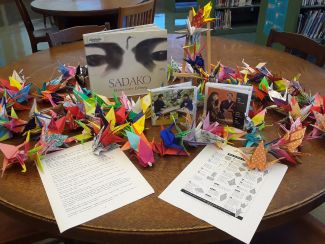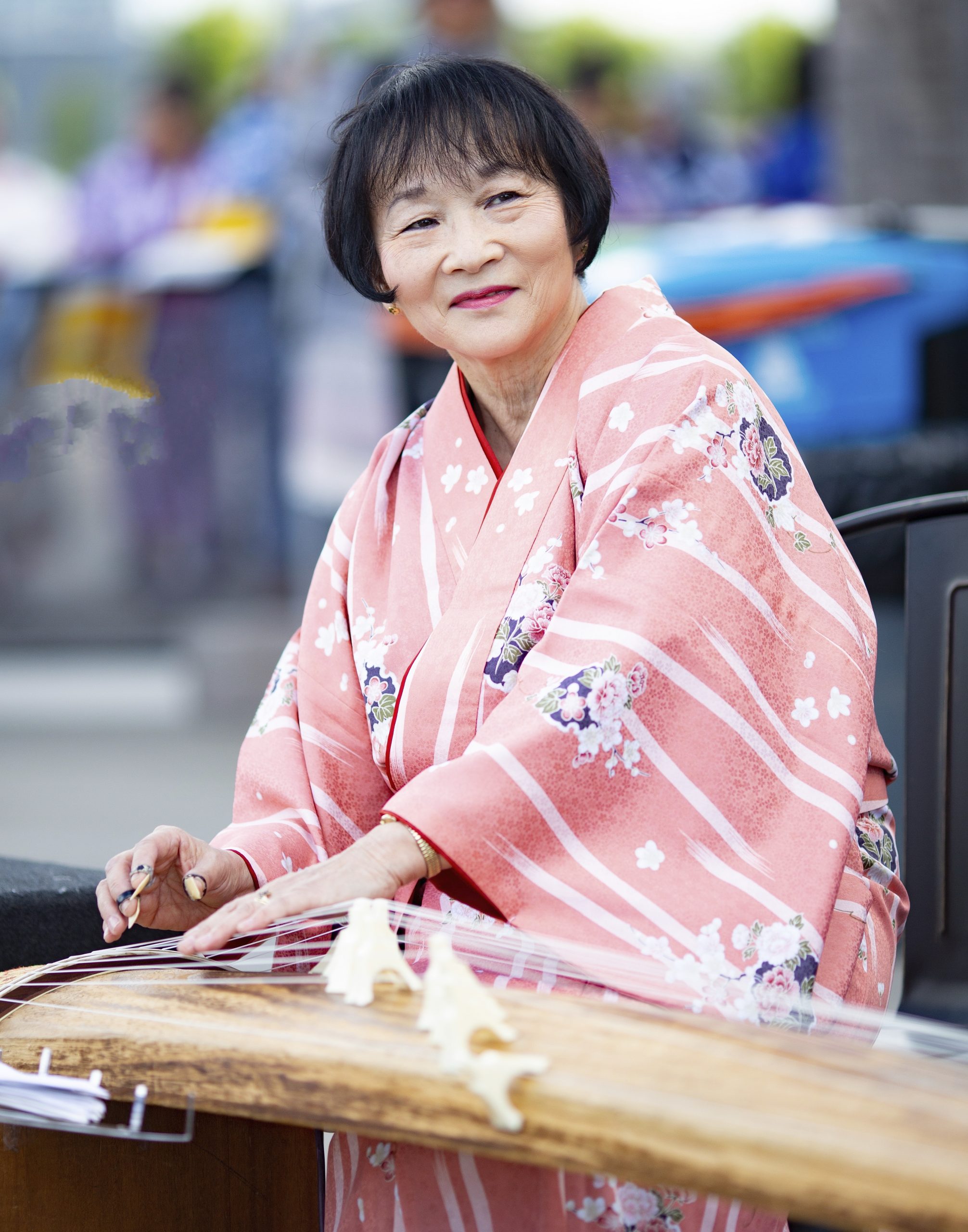
Shirley Kazuyo Muramoto
Shirley Kazuyo Muramoto is known as a musician of traditional Japanese music and has studied classical Japanese koto music extensively with several masters, including Chikushi Katsuko, Kazue Kudo, Yoko Gates and her mother, Kazuko Muramoto. She also plays jazz koto and is the director of the Murasaki Ensemble which features music from traditional to contemporary to jazz and rock, established in 1998. Shirley has performed with famed musicians Chikushi Katsuko, Sawai Kazue, Souju Nosaka Keiko, June Kuramoto, Kazue Kudo, Pete Escovedo, Maurice Jarre, and appeared on recordings with David Grisman, Lori Lewis, Elias Negash and Joe Craven, among others.
Shirley earned her “Shihan” degree (instructor’s credentials) with “Yushusho” (highest) honors and her masters “Dai Shihan” from the Chikushi Kai School based in Fukuoka, Japan. Shirley teaches koto privately and through virtual formats using the base curriculum of Chikushi Kai repertoire and traditional koto music. Shirley’s musical training includes playing the violin through her public school days in Oakland, and classical guitar at the college level. With this diverse musical background of Japanese and western music, Shirley has composed and written many arrangements for koto to suit the needs of the diverse artists she has collaborated with through the years.
Because Shirley started performing as a little girl following her mother who was also a koto teacher, she has played koto for over 60 years all over the Bay Area, across the U.S. and in Japan. During the pandemic, she learned to teach and perform via virtual formats, and also produced streamed programs such as the cultural series “NextGen Geijutsuka: Future Stars of Japanese Cultural Arts”, and “A Tribute to Sahomi Tachibana: American Legacy of a Japanese Dancer”. Recently, she curated Japanese koto programs for Nikkei Matsuri, the Consulate General of Japan and the Old First Concerts concert “Music of Kimio Eto”. In 2021, Shirley was asked to curate a virtual program with the San Francisco Symphony, “CURRENTS” series, which was conceived by the late Oakland Symphony conductor Michael Morgan. In February 2022, she performed at SFJAZZ with jazz harpist Destiny Muhammad. Shirley kept active even during the pandemic.
Shirley’s mom’s story of learning to play the koto at Topaz and Tule Lake camps during WWII led her to research Japanese traditional cultural arts in the WWII camps. The decades long project was awarded funding in 2012 to turn the research into a documentary film. The film “Hidden Legacy: Japanese Traditional Performing Arts in the WWII Internment Camps” was released in 2014 and is one of the few sources of information about how cultural arts thrived in the camps. It is now available for free viewing on YouTube. Shirley and her colleague, Prof. Minako Waseda of Kunitachi University, are currently transcribing all the interviews from the film to live on a new website dedicated to the study of Japanese traditional arts as they were practiced in the WWII camps, which will be available to the public in the next year or two. Because of her koto music stemming from the camps, Shirley feels her koto music is a direct connection to cultural arts in camp and the teachers who taught her mother to keep the koto music tradition going today. She would not have this music in her life if not for the teachers who taught her mother. For this reason, it has become a very special part of her life.
Shirley is also involved with a program educating Berkeley public elementary school students about the music of the WWII American concentration camps along with flutist and Santa Clara University music professor Rayõ Furuta, and administered by Pc Muñoz, the Director of Education and Community Engagement at Freight & Salvage.
In 2012, Shirley was honored by the Hokka Nichibei Kai Japanese American Cultural Association of America by being inducted into the Bunka Hall of Fame for her life-long dedication to teaching and performing on the Japanese koto. She has received support and funding for various projects from the City of Oakland, the SF Japantown Foundation, the Berkeley JACL, and the Apprenticeship Program from the Alliance for California Traditional Arts to train future artists for the continuance of Japanese koto music into the future.
.—————-
Shirley Kazuyo Muramoto – Japanese koto musician, teacher, band leader, filmmaker
Media
Meet Shirley Kazuyo Muramoto | Performer and teacher of the Japanese koto, researcher of Japanese traditional performing arts in the WWII American concentration camps
“Shirley Muramoto is an exemplary artist-educator who elevates every project she touches. At the Freight & Salvage we are especially proud of her work with Ráyo Furuta on our Golden State of Song arts integration program, which seeks to enhance 4th Grade California History curriculum with relevant musical content. She is also a generous collaborator who shares great knowledge, ideas and resources in service of the vision at hand. I’d work with her again anytime.”
PC Muñoz, Director of Education & Community Engagement, Freight & Salvage, Berkeley, CA
The New Moon Newsletter from the Alliance for California Traditional Arts – October 2021
The New Moon Newsletter from the Alliance for California Traditional Arts featured a Q&A with me about my experience performing with the SF Symphony recently in their CURRENTS series, interview by Lily Kharrazi, “Traditional Koto at the Symphony”,
CONTINUING TRADITIONS: The evolution of koto artist Shirley Kazuyo Muramoto
April 3, 2021 by Kenji G. Taguma, Nichibei Weekly
Events
Upcoming Events
Events 2024
June 24-28, 2024 Youth Summer Music and Culture Camp, Morikami Museum and Gardens, Delray Beach, Florida https://morikami.org/event/youth-summer-music-and-culture-camp/
June 29-30, 2024 Japanese Traditional Music Program, Morikami Museum and Gardens, Delray Beach, Florida https://morikami.org/event/japanese-traditional-music-workshops/
Sunday, July 21, 2024 Oakland A’s, Shirley Kazuyo Muramoto to perform
“The Star Spangled Banner”
Tuesday, August 6, 2024 3:30p Peace Day, Berkeley Public Library
Past Events
Events 2024
January, March, April, May 2024
FREIGHT & SALVAGE/BUSD VAPA DEPARTMENT PARTNERSHIP, Golden State of Song, Golden State of Song: Japanese American World War II Concentration Camps Module, with Reiko Iwanaga, Erika Oba, Brian Mitsuhiro Wong and Ray Furuta https://thefreight.org/busd-resources/
Friday, May 17, 2024 SF Giants Japanese Heritage Day, Shirley Kazuyo Muramoto to perform “The Star Spangled Banner”
Jan. 4th, 2024 Thursday
– SF Japantown Foundation Osechi Ryori Annual Fundraiser https://japantownfoundation.org/events/
Thursday, Feb. 29, 2024, UC Berkeley Asian American Studies class, Prof. Lisa Tsuchitani
January, March, April, May 2024
FREIGHT & SALVAGE/BUSD VAPA DEPARTMENT PARTNERSHIP, Golden State of Song, Golden State of Song: Japanese American World War II Concentration Camps Module, with Reiko Iwanaga, Erika Oba, Brian Mitsuhiro Wong and Ray Furuta https://thefreight.org/busd-resources/
Saturday, April 6, 2024 For opening of exhibit,
“Japanese Prints in Transition: From the Floating World to the Modern World”
at Palace of Legion of Honor, San Francisco, CA
with Bando Hirohichiro, Kyo no Kai, Shirley Kazuyo Muramoto and Brian Mitsuhiro Wong
Japanese Prints in Transition: From the Floating World to the Modern World (famsf.org)
11am – noon History of Kabuki and its influences on our contemporary times (lecture by Prof. Kirk Kanesaka/Bando Hirohichiro) at Gunn Theater
12:30 pm- 1 pm Kyo no Kai performance (Kiyo and Ryan) at Court of Honor
1. Nagauta Shichifukujin Kinoe machi
2. Kiyomoto Sakura
3. Finale
2 pm – 3 pm Kabuki performance (Bando Hirohichiro and Muramoto-Wong Sensei) at Gunn Theater
1. Highlights from Nagauta “Echigo jishi” (Bando Hirohichiro)
2. Koto (Shirley Kazuyo Muramoto)
3. Jiuta “Kurokami” (Bando Hirohichiro, Shirley Muramoto and Brian Mitsuhiro Wong)
Thursday, April 11, 2024 10:00a-2:00p San Francisco Airport celebrates Cherry Blossom Festival
Saturday, April 27, 2024 12:15p-1:00p Cupertino Cherry Blossom Festival, Quinlan Center
Topaz Art Pilgrimage
Wednesday, May 1, 2024 timeTBA Topaz Museum koto program, with Shirley Muramoto, Brian Wong and Stephanie and Bessie Skeem
Thursday, May 2, 2024, 5:15P-6:00P Koto program, Topaz Art Pilgrimage, University of Utah Art Museum,
Friday, May 3, 2024 6pm Topaz Art Pilgrimage, Salt Lake City Buddhist Temple (program 12p-7p)
Events 2023

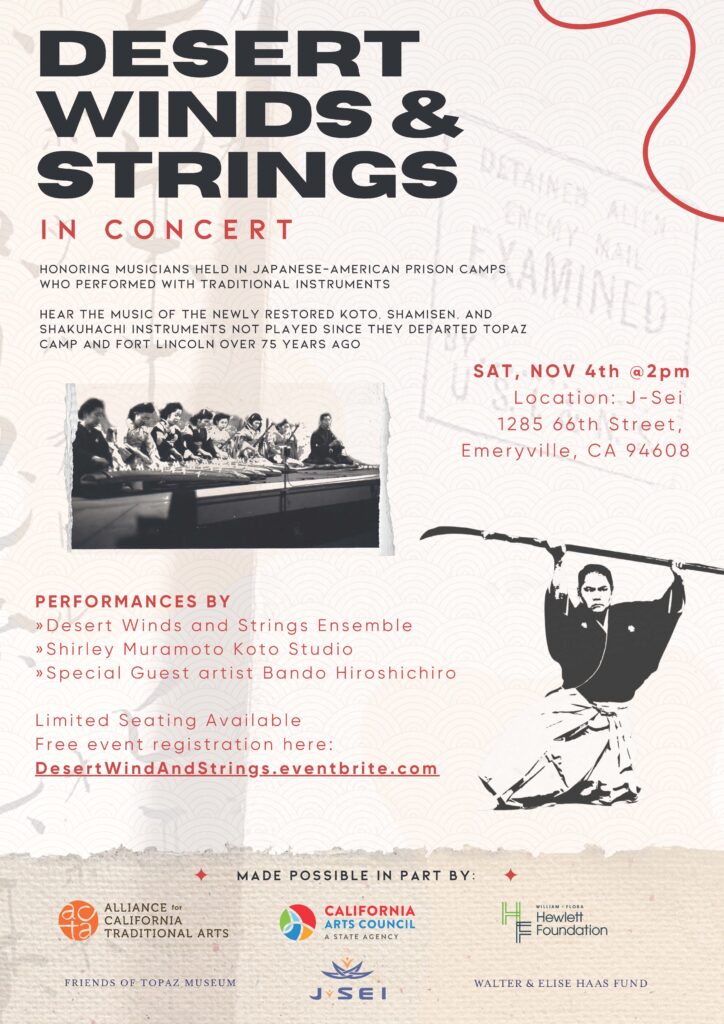
DESERT WIND AND STRINGS: IN HONOR OF MUSICIANS HELD IN JAPANESE AMERICAN PRISON CAMPS WHO PERFORMED TRADITIONAL MUSIC
For Immediate Release
“To honor the musicians who kept Japanese traditional music alive while incarcerated in the Japanese American prison camps Shirley Kazuyo Muramoto, friends and students will perform. Hear the music of newly restored koto and shamisen instruments that have not been played since the Yukako Tama Nakata Nakamoto family departed Topaz camp, and Tokushige Kizuka’s restored shakuhachi which was played when he was incarcerated in the Fort Lincoln internment camp in Bismarck, North Dakota. Kabuki dancer and teacher Bando Hiroshichiro will perform a Nihon Buyo traditional dance that was well known to the Issei generation.”
Instruments that have survived for almost 80 years in the camps will be heard for the first time in this special concert. Traditional and contemporary works will be performed.
EMERYVILLE, CA – SF Bay Area musician of the Japanese koto Shirley Kazuyo Muramoto feels Japanese cultural arts are dying. “Japanese Americans and even native Japanese are not interested in the traditional arts. There is a stigma about these cultural arts being tired and boring, which is sad because they are full of life and meaning.” After WWII, Japanese Americans felt the need to assimilate into American culture and reject traditional arts.
“Someone told me recently that young people are not interested in Japanese music and dance anymore,” says Shirley, “but I have a couple of young students who found me on the internet. They heard and saw Japanese music, and they liked it and wanted to learn. “Some students came to me during the pandemic to find a way to express themselves in a quieter way to subdue their anxiety through koto music.”
Shirley explains, “The Japanese people have a wide range of emotions, which is expressed through cultural arts. They range from lively taiko rhythms to the more subtle music and dance of koto and Nihon buyo. In this fast-paced world where everything seems to be moving at an astronomical rate, people are seeking out cultural Japanese arts to connect to something deeper.”
Shirley came to learn the Japanese koto through her mother, Kazuko Muramoto, who was a koto teacher in the Bay Area since the late 1950s. Kazuko learned to play the koto as a 9-year-old child at Topaz prison camp in 1942 from SF koto teacher Haruko Suwada. Through research, Shirley uncovered a photo of Suwada Sensei in a performance at Topaz around 1944, performing with her students. She was able to identify most of the musicians in the photo through the help of Grace Oshita, who is also in the photo. (photo courtesy Kent Nakamoto)

It was not easy to continue practicing Japanese arts in the WWII prison camps where 120,000+ Japanese and Japanese Americans were incarcerated. An edict was sent out to the camps at the beginning of the incarceration in the camps:
“The WRA (War Relocation Authority) does not intend to promote ideals and cultures of nations with which we are at war, so long as patriotic music is not played. Japanese music may be played in the center but it will not be sponsored by the government.” (Manzanar Free Press, Sept. 19, 1942)
Fast forward about 78 years. After years of gathering interviews from artists in the camps Shirley produced a documentary, “Hidden Legacy: Japanese Traditional Performing Arts in the WWII Internment Camps”, and lectured on the subject at colleges and universities in the U.S. and Japan. A shakuhachi played by a Watsonville farmer who was incarcerated at Fort Lincoln justice department camp surfaced, with the etching of the Bismarck, ND prison address scratched on the case, and the sheet music stamped, “Detained Enemy Alien Mail EXAMINED”.
(photos by Monty Levenson)
(

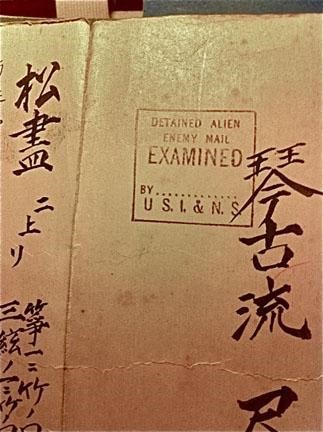
Recently koto and shamisen instruments last played at Topaz prison camp by Yutako Tama Nakata, another student of Suwada Sensei, was brought to Shirley by Kent Nakamoto, Tama’s son.
“For some reason, it’s as though these instruments of the camps have suddenly appeared so their stories could be expressed, and their music could be heard once more,” Shirley remarks. “The history that led Japanese Americans to shun cultural things because they were thought to be ‘un-American’ is now found to be incredibly American as people are learning to embrace their cultural heritage, finding out more about themselves through DNA testing sites. Traditional cultures that immigrants brought to the U.S. have become part of the underlying fabric of American culture because we influence each other’s arts here. It becomes new, fresh, and uniquely American. We need to be reminded about how special these arts are to us because through them we learn more about ourselves.”
Music and dance presented in this program is based on information Shirley has researched on traditional arts in the camps. This special concert is being presented live and in person, and for free. Japanese music that was played in the camps will be part of the program, as well as a special dance by Bando Hiroshichiro, a dance which was performed at Amache prison camp by Yoshino Harada Okubo.
There will be limited seating, and you must have a reservation through Eventbrite.
An accompanying exhibit, “Desert Winds & Strings: A Historical Exhibit” shares the story of Japanese traditional artists who performed in America’s concentration camps. The exhibit will be on display from November 1 to 17 in the J-Sei gallery. Gallery Hours: MWF 10-1, TuTh 1-5
DATE: Sat. Nov. 4, 2023th, 2p-4p
LOCATION: J-Sei, 1285 66th St, Emeryville, CA 94608
TICKET INFO: Free with reservation on Eventbrite Suggested donation: $10-$15. Limited seating available. Desert Wind and Strings Tickets, Sat, Nov 4, 2023 at 2:00 PM | Eventbrite
UPDATE: This concert is now sold out. There will be a recording of the program in the near future. The exhibit will be open to the public on dates and times specified.
SPONSORS: Alliance for California Traditional Arts Living Cultures grant, California Arts Council, William and Flora Hewlett Foundation, Walter and Elise Haas Fund, J-Sei, Friends of Topaz
Sat Aug 19th , 2023 7:PM performing with Chidori Band annual concert, with
Brian Mitsuhiro Wong
www.chidoriband.com
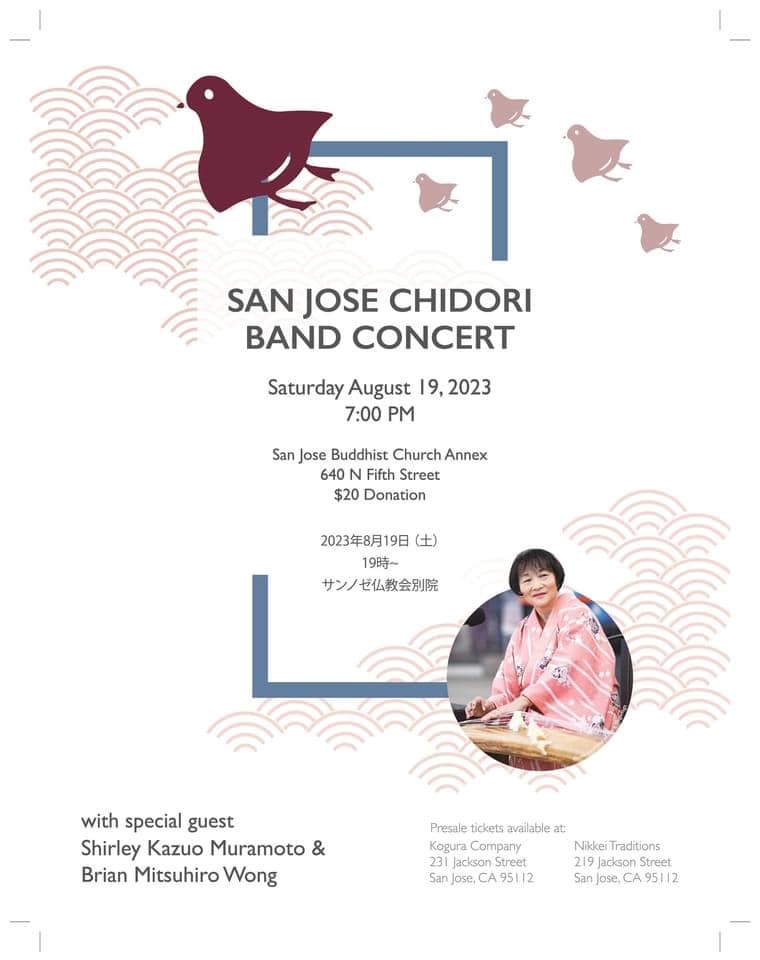
Wed Aug 9 3:30 PM, Peace Day, Berkeley Public Library
June 25 thru July 2 –Morikami Museum and Japanese Gardens, presenting koto workshops for youth and adults https://morikami.org/event/japanese-traditional-music-workshops/
Schedule
Times
- Beginner Session
- Times
- 1-Week Session: 9:00am – 4:00pm
Dates - June 26 – June 30, 2023
- Price
- $275 per student
- Ages
- For grades 3rd – 12th
- Location
- Throughout the Morikami Museum & Gardens
- Materials
- Instruments and sheet music will be provided for participants to use in the class.
- *Recommended companion Koto instructional book available for $35 from instructor Joseph Amato.
Dates
Saturday & Sunday, July 1 & 2, 2023 (2-Day Workshop)
Price
$200 per session (2-Day Workshop – 6 hours total)
Location
Morikami Theater
Guest Artist
Each season brings a variety of guest artists looking to share their craft with an eager audience.
Register Adult Music Workshops
- Workshop: Guest Koto$200.00 Saturday & Sunday, July 1 & 2, 2023 (2-Day Adult Workshop)
- Beginner & Intermediate Sessions:
- 9:00am-12:30pm (10am-10:30am break) (Beginners)
- 1:30pm – 5:00pm (2:30pm – 3:00pm break) (Intermediate)*
- *Intermediate Session: complete beginner’s course or prior experience with the instrument
- Beginner & Intermediate Sessions:
Where
Morikami Museum & Japanese Gardens
4000 Morikami Park Road
Delray Beach, Flo
Jan. 22 –Concert with Ola Herasymenko Oliynyk of the (Ukrainian) Bandura Ensemble of Northern California, and Shirley Kazuyo Muramoto and her koto students, to benefit Ukraine
Jan. 24 – Lecture/demonstration on koto and Japanese cultural arts practiced in the WWII American concentration camps/koto demonstration at Prof. Ráyo Ray Furuta‘s Intro to Listening: Global Music class at Santa Clara University.
March 11 – UC Berkeley Outstanding Alumna of 2023, presented by the Japanese American Women Alumae of UC Berkeley https://jawaucb.org/
March 29 and 30 Sunrise of Redwood City
April 6 Thursday 5p-6:30p Concert at North Carolina State University, Witherspoon Student Cinema, with Prof. Kirk Kanesaka of George Mason University aka as Bando Hiroshichiro, Kanako Ford, Mihoko Fujita, Matt Masten and Miki Walker, sponsored by NC Japan Center, NC State University https://jacan.ncsu.edu/

Wed Apr 12 10a-2p SFO Celebrates Cherry Blossom Festival at Terminal 3 https://eglobaltravelmedia.com.au/2023/04/06/cherry-blossom-festival-returns-to-sfo/
Wed April 19 Noon Concert at Santa Clara University, introducing my new teacher, Emily Kazuchiye Imazumi ** https://scupresents.org/university-music-concerts/#m@n-spring-
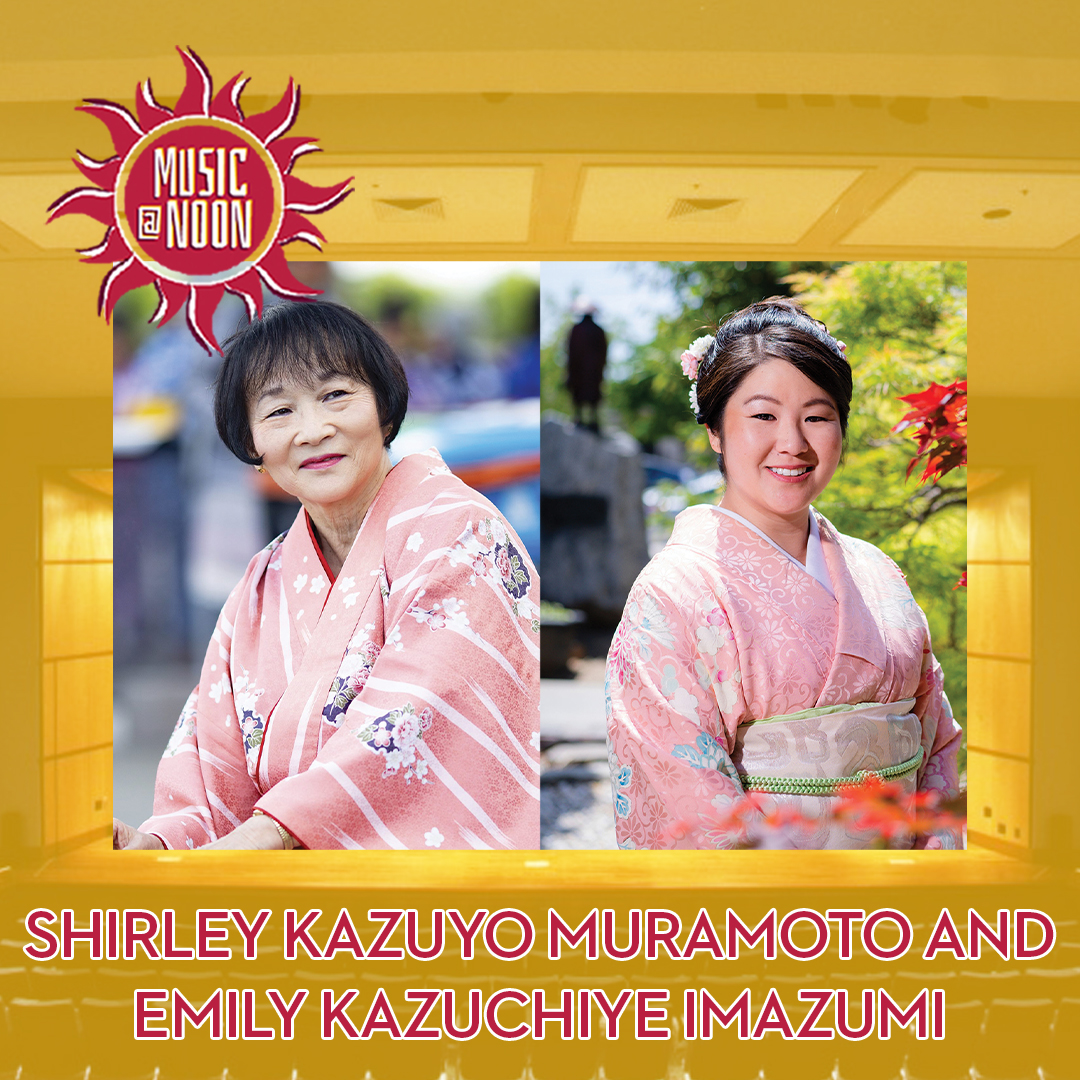
April 23 Sunday Nikkei Matsuri, 12p-12:30p featuring Emily Kazuchiye Imazumi, Brian Mitsuhiro Wong and Shirley Kazuyo Muramoto and friends.https://nikkeimatsuri.org/
April 29 Saturday Cupertino Cherry Blossom Festival, Quinlan Community Center 2:25p-2:55p
https://www.cupertinocherryblossomfestival.org/more/2023-festival
May 12th, Friday, 4p-5p Shirley Kazuyo Muramoto Koto Performance @ Central | Berkeley Public Library sponsored by the Berkeley Public Library
May 15 Monday, 7p-8p “Strings of Hope: Bandura and Koto for Ukraine” – program of music and stories of Ukrainian people and of their heritage, from Ukraine and Sacramento, featuring Ukrainian bandura teacher and performer Ola Herasymenko Oliynyk, and her students Sofiia Ishchuk and her father Dmytro Ishchuk who will be tuning in from Ukraine, and Caterina Biscardi, who is of Ukrainian and American descent. Fundraiser for Ukraine, Registration required. Check here for further info.
Wed May 17 Alameda Japanese American History Project, exhibition opening at Alameda Free Library, 4pm https://docs.google.com/document/d/1Ir32czNyXYpiX6wQ6ufWTXv_3G_T1A-bj4c19ohrve8/edit
Events 2022
Aug. 19 – Darioush Winery, Napa – corporate event
Aug. 20 – Koto sharing event, virtual and in person – koto players from the Bay Area, Washington, Salt Lake City UT, North Carolina
Sept. 25 – Video shoot for new streaming service in Singapore
Sept. 30 – Wedding, Wakamatsu Farm, Placerville, CA
Oct. 30 – Memorial, Piedmont Gardens, Oakland, CA
Dec. 14 – 65th Anniversary of San Jose and Okayama Sister City Program, Japanese Friendship Tea House, San Jose, CA
August 9, 2022 - 3:30pm
Peace Day Commemoration / Sadako and the Thousand Cranes
Join us for a Peace Day Commemoration on the lawn of North Branch Library. Listen to beautiful koto music by Shirley Kazuyo Muramoto, learn how to fold an origami crane, and hear about the story of Sadako Sasaki, a young girl who lived through the bombing of Hiroshima, but died years later from the effects of the atomic bomb. She was made famous for folding 1,000 origami cranes in the hopes that her wish to survive would be granted.
Ages 8 and up and families are welcome. Sponsored by the Friends of the Berkeley Public Library
Grace Cathedral Sound Bath— Celebrate the Koto
Monday, July 25 @ 7:00 pm – 8:30 pm
Grace Cathedral Sound Bath— Celebrate the Koto
1100 California Street, San Franccisco, CA 94108
https://gracecathedral.org/caledar-events/grace-cathedral-sound-bath-2/
May 16, 2022 6:30 PM Delta High School, Delta, Utah.
Koto and Trumpet Concert, with SFSymphony Principal Trumpet Mark Inouye
Photo credits
Shirley Kazuyo Muramoto by Mark Shigenaga
Mark Inouye by Nobuo Mikawa
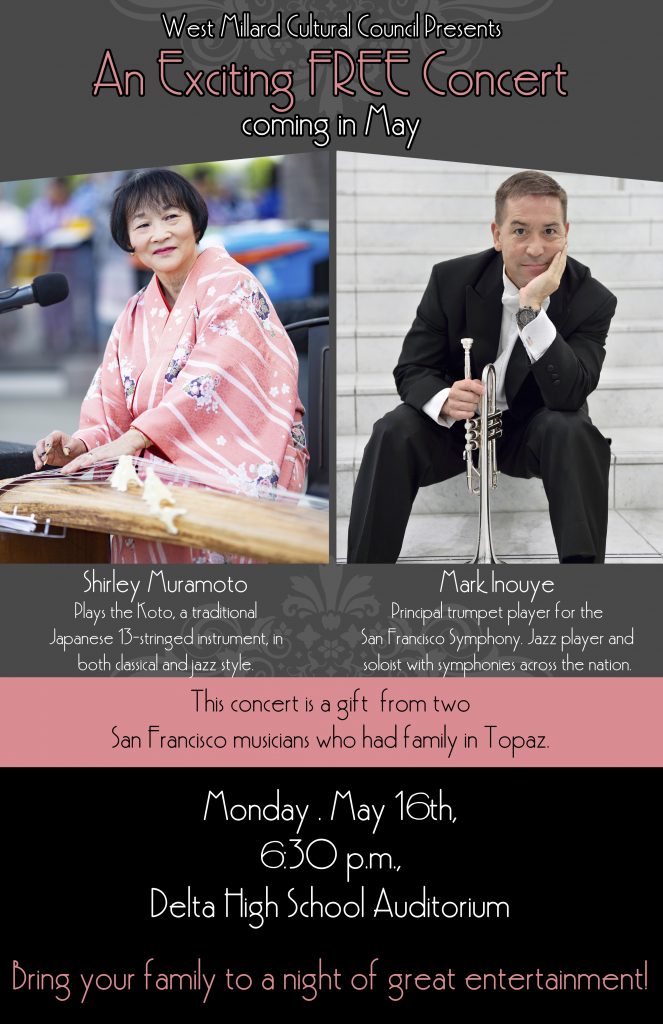
April 30, 2022 1:45p-2:15p at Memorial Park, Quinlan Community Center
Cupertino Cherry Blossom Festival, with Isabella Kazuai Lew and students,
https://www.cupertinocherryblossomfestival.org/

April 24, 2022 Nikkei Matsuri, with Emily Imazumi and students, San Jose Japantown at San Jose Buddhist Church, https://nikkeimatsuri.org/
This Sunday, April 24 at 12:30p, Chikushi Kai teachers and students of the Bay Area will be performing at the Nikkei Matsuri, our first in-person music program! We will play a koto piece from an anime as well as other koto and shakuhachi selections. We will be on the indoor stage where there will be other displays, as well. There will be booths and bands, martial arts and taiko, and food! So come on down and join us for a day of music and fun!
April 21 and 22, 2022 10a-1p, 20 minutes top of every hour – SFO neighborhood activations strive to bring the infectious electricity of San Francisco life to travelers upon arrival at the airport in a series of “Discover SF” neighborhood activations at the airport, starting with Japantown, activities, and information about J-Town and the Cherry Blossom Festival
April 10th 2022 at Oakland Buddhist Church, 825 Jackson Street, Oakland, outdoors. Talk about how Buddhist churches were places were Japanese arts were and continue to be offered including Japanese language schools and performances that occurred in the 1920s through 1940s at the Buddhist Church of Oakland, along with koto demonstration.
Feb 26, 2022 Gardena Valley JCI Day of Remembrance
– This year, the GVJCI Day of Remembrance (DOR) 2022 event will be held online via Zoom on Saturday, February 26th, 2022 from 2:00pm to 4:00pm. This year’s DOR theme will be “Camp Creativity: Resilience Through Art” with the intention of highlighting the courage, healing, and creativity of camp survivors through fine and performing arts. Specifically, we will be sharing works ranging from cultural performances, big band music, and more. From February 22-25, the GVJCI will be publishing these stories through special video interviews, film clips, music playlists, and photographs. The February 26th live program will feature interviews with some of those featured throughout the week of the virtual DOR on the GVJCI website. From these collections, viewers will gain new knowledge in the experiences of Japanese Americans incarcerated during World War II. We hope the community will be able to walk away with a greater understanding of the history of this time period and the fortitude and resilience of its survivors.
Feb 3, 2022 SFJAZZ performing with Destiny Muhammad, Jazz and Social Justice, 7pm and 8:30p https://www.sfjazz.org/tickets/productions/destiny-muhammad-2122/
Events 2021
Feb 17, 2021 Consulate General of Japan, San Francisco virtual program, “Japanese Strings: Past and Present”, Shirley Kazuyo Muramoto performing with Brian Mitsuhiro Wong; also on the program is Kyle Abbott/shamisen
https://www.facebook.com/cgjsf1/videos/252738819682667
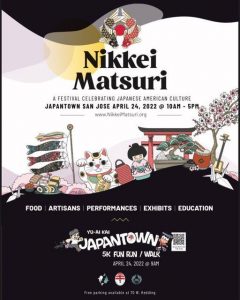
April 24, 2021 Nikkei Matsuri, virtual https://www.youtube.com/watch?v=-I4mnZI7q8o
May 26, 2021 Music @ Noon, Santa Clara University virtual concert http://scupresents.org/performances/music-noon-japanese-koto-shirley-muramoto?fbclid=IwAR3laUbLwBnpdj4sNymnyBG2ThD8UTrlPpG1KcGxngk4x5WVnO6jSMOf8R8
June 19, 2021 Memorial, private, Manka’s Inverness Lodge Boathouse
July 15, 2021 Asian Art Museum private event, Murasaki Trio
July 31, 2021 Oakland Obon virtual event
Aug 6, 2021 Berkeley Public Library Peace Day, virtual https://www.berkeleypubliclibrary.org/events/peace-day-commemoration
Aug 21, 2021 Shinzen Garden, Fresno, Toro Nagashi Lantern Festival
September 2021 SF Symphony CURRENTS virtual series, “Niji”, curated by Shirley Kazuyo Muramoto
Explore the intersection between classical music and Japanese classical musical culture.
https://www.sfsymphonyplus.org/videos/niji-rainbow
Koto master and curator Shirley Muramoto joins San Francisco Symphony musicians in a program that celebrates the elegant power of an instrument to connect across genres and reflect the endless diversity of our community.
Shirley Muramoto expresses, “I called [this program] ‘Niji’ because it represents a rainbow of different people and different things in the Bay Area that I’ve had the fortune to connect with and collaborate with and share music with.”
Shirley Muramoto, curator
Program:
TRADITIONAL (arr. Shirley Kazuyo Muramoto): ‘Sakura’ (Cherry Blossom)
Shirley Kazuyo Muramoto, koto
NAGASAWA KATSUTOSHI: Movement II from ‘Futatsu no Deneshi’ (Two Pastorals)
Shirley Kazuyo Muramoto, koto
Brian Mitsuhiro Wong, bass koto
Linda Lukas, flute
CHIKUSHI KATSUKO (arr. Kaoru Watanabe): ‘Nagare’ (Flow)
Shirley Kazuyo Muramoto, koto
Brian Mitsuhiro Wong, bass koto
Catherine Payne, flute
In Sun Jang & Raushan Akhmedyarova, violins
James Button, oboe
Carey Bell, clarinet
Steven Dibner, bassoon
Robert Ward, horn
David Kim, viola
Peter Wyrick, cello
Charles Chandler, double bass
SHIRLEY KAZUYO MURAMOTO & BEN PADERNA (arr. Matt Wong): ‘Niji’ (Rainbow)
Shirley Kazuyo Muramoto, koto
Brian Mitsuhiro Wong, shakuhachi bamboo flute
Jerome Simas, clarinet
Steven Braunstein, bassoon
Aaron Schuman, trumpet
Paul Welcomer, tenor trombone
Sarn Oliver & Suzanne Leon, violins
David Gaudry, viola
Amos Yang, cello
Charles Chandler, double bass
Vince Delgado, egyptian tabla
Destiny Muhammad, harp
Currents is sponsored by Chevron
Oct 7 Santa Clara University, Global Music, Music and Social Justice class, Ray Furuta/professor
Media
Hidden Legacy
HIDDEN LEGACY: JAPANESE TRADITIONAL PERFORMING ARTS IN THE WWII INTERNMENT CAMPS
It has been almost 80 years since the Executive Order 9066 during World War II led to the forcible relocation of approximately 120,000 Japanese nationals and Japanese Americans, about two-thirds were American citizens, into American concentration camps. Though much has been researched and written about this American history, there is still a subject which has not been thoroughly researched, and that is the story of how those incarcerated survived the prison camps for the four to five years they were imprisoned there.
The Hidden Legacy project researched and collected stories from former incarcerated artists and Sansei and Yonsei students who learned from some of these teachers. The questions were: how and why did traditional Japanese arts in the camps continue, how they used creativity to practice them, and how they fashioned equipment, kimonos, instruments and so on to be able to practice them. These arts played a critical role in the lives of those incarcerated to continue to survive and help them be resilient. After the war as many felt these traditional arts would make them appear “un-American”, many shunned these arts. Now, we are learning that traditional cultural arts and music aid in survival and continue to do so today as we learn how the arts help us to understand ourselves. Trying to survive in this pandemic, we have found that the arts also help us today to stay resilient. This project emphasizes the importance and benefits of keeping traditional arts alive not only for ourselves but for future generations as well.
The documentary film, “Hidden Legacy: Japanese Traditional Performing Arts in the WWII Internment Camps” (2014) can be seen on YouTube
CONTACT
510-482-1640
